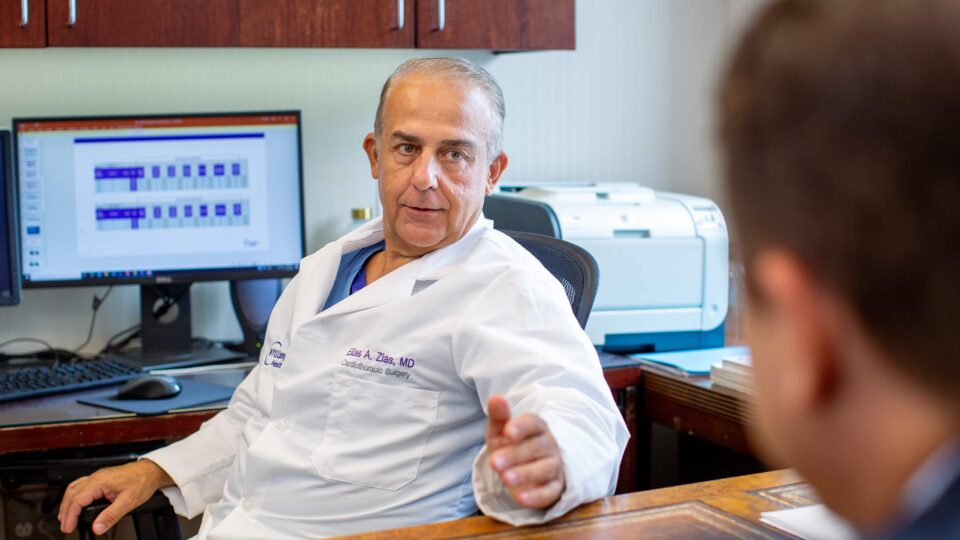A hallmark of acute COVID-19 is the high incidence of thrombotic events associated with moderate to severe illness. The Accelerating COVID-19 Therapeutic Interventions and Vaccines 4 ACUTE (ACTIV-4A) study, part of the National Institutes of Health (NIH)-coordinated ACTIV research program, is a landmark trial involving more than 3,000 patients in the U.S. and other countries investigating potential strategies to address vascular integrity and thromboinflammation in hospitalized patients with COVID-19.
“Early on in the pandemic we noticed a lot of clotting, both microscopically and macroscopically—often in places where we don’t usually see it,” says Jeffrey S. Berger, MD, director of the Center for the Prevention of Cardiovascular Disease and an expert on the etiology of thrombotic disease.
Dr. Berger was appointed a co-principal investigator of ACTIV-4A after developing a pilot study on the use of heparin for preventing thrombotic events among patients with COVID-19 in the NYU Langone Health system. The NIH adapted the protocol for that study as the basis for the larger trial.
“After just over a year’s work, we were able to change clinical practice.”
Judith S. Hochman, MD
International Collaboration Accelerates Results
Another NYU Langone researcher, Judith S. Hochman, MD, the Harold Snyder Family Professor of Cardiology, was named study chair of ACTIV-4A. As a leader of complex international clinical trials such as ISCHEMIA, OAT, and SHOCK, Dr. Hochman is known for her skills at developing and harmonizing protocols and data analysis plans, as well as fostering cooperation among researchers around the world.
In addition to coordinating the work of over two dozen U.S. institutions, ACTIV-4A has collaborated with two multinational consortiums—Antithrombotic Therapy to Ameliorate Complications of COVID-19 (ATTACC, based in Canada), and Randomized, Embedded, Multifactorial Adaptive Platform Trial for Community-Acquired Pneumonia (REMAP-CAP, based in the United Kingdom).
“During a pandemic, you need global collaboration,” Dr. Hochman explains. “By working with these partners, we’ve been able to get powerful datasets much more quickly than anyone could have done alone.”
“We hypothesized that one reason patients with COVID-19 do badly is that their platelets are making the endothelium very active.”
Jeffrey S. Berger, MD
An Evolving Investigation
In August 2021, the ACTIV-4A investigators and their global partners published initial findings in the New England Journal of Medicine—a pair of reports on prophylactic versus therapeutic heparin in patients moderately ill and critically ill with COVID-19. Full-dose heparin, the studies showed, improved survival and other outcomes in the former group, but not the latter. The effects in critically ill patients tended toward harm.
The following month, researchers led by Dr. Berger and Tessa J. Barrett, PhD, assistant professor of medicine and pathology, published a paper in Science Advances describing several pathways by which platelets amplify endotheliopathy in COVID-19. Although the study was not part of ACTIV-4A, its findings would influence the course of that trial.
“We hypothesized that one reason patients with COVID-19 do badly is that their platelets are making the endothelium very active,” Dr. Berger explains. “We wanted to find out how that happens.”
The team, including Dr. Hochman, identified two genes that are upregulated in the platelets of patients with COVID-19, leading to overproduction of proteins associated with increased clotting and vascular inflammation.
The researchers also reported that medications known to block platelet activation via the P2Y12 receptor reduced inflammation in vessels related to COVID-19. And they showed that platelets from patients with COVID-19 alter endothelial cells largely via P-selectin, a cell adhesion molecule.
These findings spurred new lines of inquiry in ACTIV-4A, beginning with a clinical trial of P2Y12 inhibitors combined with therapeutic heparin in 562 patients moderately ill with COVID-19.
Directions for Further Research
In November, at the American Heart Association Scientific Sessions, the ACTIV-4A investigators reported disappointing initial results: P2Y12 inhibitors failed to improve survival or disease severity in the moderately ill cohort. These results were recently published in JAMA.
Nonetheless, ACTIV-4A is continuing to test these drugs in critically ill patients. In addition, enrollment has begun for trials of a P-selectin inhibitor, crizanlizumab. Another new arm will test SGLT2 inhibitors, which have been shown to improve cardiovascular outcomes in diabetes by promoting endothelial integrity.
ACTIV-4A has already had an impact, Dr. Hochman emphasizes. Many medical centers have stopped using therapeutic-dose heparin in hospitalized patients critically ill with COVID-19. In December, the American Society of Hematology issued draft guidelines recommending therapeutic heparin for inpatients with moderate illness. And in January, the NIH also updated its heparin guidelines to reflect the trial’s findings. “After just over a year’s work, we were able to change clinical practice. I’m confident that we will continue to do so going forward,” Dr. Hochman says.







